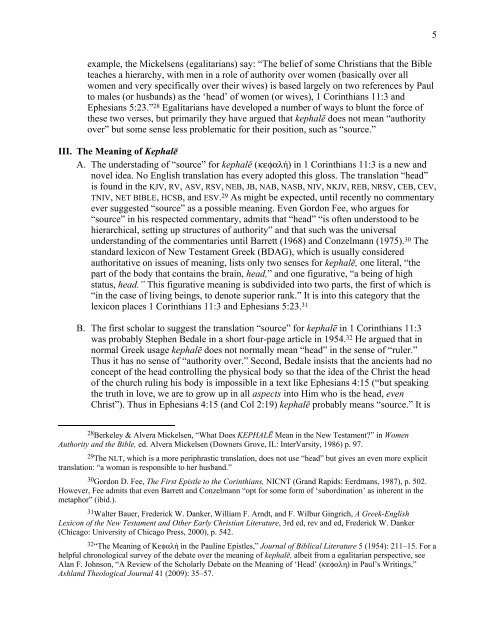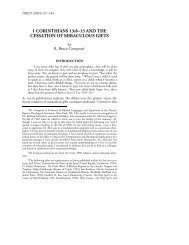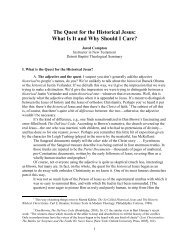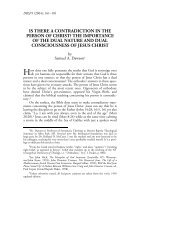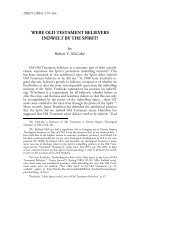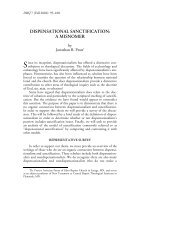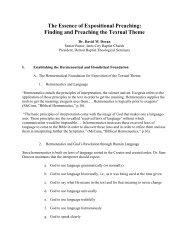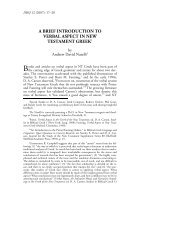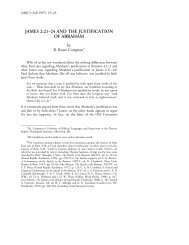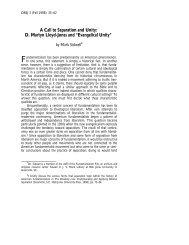Combs, Role of Women in the Church - Detroit Baptist Theological ...
Combs, Role of Women in the Church - Detroit Baptist Theological ...
Combs, Role of Women in the Church - Detroit Baptist Theological ...
You also want an ePaper? Increase the reach of your titles
YUMPU automatically turns print PDFs into web optimized ePapers that Google loves.
5example, <strong>the</strong> Mickelsens (egalitarians) say: “The belief <strong>of</strong> some Christians that <strong>the</strong> Bibleteaches a hierarchy, with men <strong>in</strong> a role <strong>of</strong> authority over women (basically over allwomen and very specifically over <strong>the</strong>ir wives) is based largely on two references by Paulto males (or husbands) as <strong>the</strong> ‘head’ <strong>of</strong> women (or wives), 1 Cor<strong>in</strong>thians 11:3 andEphesians 5:23.” 28 Egalitarians have developed a number <strong>of</strong> ways to blunt <strong>the</strong> force <strong>of</strong><strong>the</strong>se two verses, but primarily <strong>the</strong>y have argued that kephalē does not mean “authorityover” but some sense less problematic for <strong>the</strong>ir position, such as “source.”III. The Mean<strong>in</strong>g <strong>of</strong> KephalēA. The understad<strong>in</strong>g <strong>of</strong> “source” for kephalē (κεφαλή) <strong>in</strong> 1 Cor<strong>in</strong>thians 11:3 is a new andnovel idea. No English translation has every adopted this gloss. The translation “head”is found <strong>in</strong> <strong>the</strong> KJV, RV, ASV, RSV, NEB, JB, NAB, NASB, NIV, NKJV, REB, NRSV, CEB, CEV,TNIV, NET BIBLE, HCSB, and ESV. 29 As might be expected, until recently no commentaryever suggested “source” as a possible mean<strong>in</strong>g. Even Gordon Fee, who argues for“source” <strong>in</strong> his respected commentary, admits that “head” “is <strong>of</strong>ten understood to behierarchical, sett<strong>in</strong>g up structures <strong>of</strong> authority” and that such was <strong>the</strong> universalunderstand<strong>in</strong>g <strong>of</strong> <strong>the</strong> commentaries until Barrett (1968) and Conzelmann (1975). 30 Thestandard lexicon <strong>of</strong> New Testament Greek (BDAG), which is usually consideredauthoritative on issues <strong>of</strong> mean<strong>in</strong>g, lists only two senses for kephalē, one literal, “<strong>the</strong>part <strong>of</strong> <strong>the</strong> body that conta<strong>in</strong>s <strong>the</strong> bra<strong>in</strong>, head,” and one figurative, “a be<strong>in</strong>g <strong>of</strong> highstatus, head.” This figurative mean<strong>in</strong>g is subdivided <strong>in</strong>to two parts, <strong>the</strong> first <strong>of</strong> which is“<strong>in</strong> <strong>the</strong> case <strong>of</strong> liv<strong>in</strong>g be<strong>in</strong>gs, to denote superior rank.” It is <strong>in</strong>to this category that <strong>the</strong>lexicon places 1 Cor<strong>in</strong>thians 11:3 and Ephesians 5:23. 31B. The first scholar to suggest <strong>the</strong> translation “source” for kephalē <strong>in</strong> 1 Cor<strong>in</strong>thians 11:3was probably Stephen Bedale <strong>in</strong> a short four-page article <strong>in</strong> 1954. 32 He argued that <strong>in</strong>normal Greek usage kephalē does not normally mean “head” <strong>in</strong> <strong>the</strong> sense <strong>of</strong> “ruler.”Thus it has no sense <strong>of</strong> “authority over.” Second, Bedale <strong>in</strong>sists that <strong>the</strong> ancients had noconcept <strong>of</strong> <strong>the</strong> head controll<strong>in</strong>g <strong>the</strong> physical body so that <strong>the</strong> idea <strong>of</strong> <strong>the</strong> Christ <strong>the</strong> head<strong>of</strong> <strong>the</strong> church rul<strong>in</strong>g his body is impossible <strong>in</strong> a text like Ephesians 4:15 (“but speak<strong>in</strong>g<strong>the</strong> truth <strong>in</strong> love, we are to grow up <strong>in</strong> all aspects <strong>in</strong>to Him who is <strong>the</strong> head, evenChrist”). Thus <strong>in</strong> Ephesians 4:15 (and Col 2:19) kephalē probably means “source.” It is28 Berkeley & Alvera Mickelsen, “What Does KEPHALĒ Mean <strong>in</strong> <strong>the</strong> New Testament?” <strong>in</strong> <strong>Women</strong>Authority and <strong>the</strong> Bible, ed. Alvera Mickelsen (Downers Grove, IL: InterVarsity, 1986) p. 97.29 The NLT, which is a more periphrastic translation, does not use “head” but gives an even more explicittranslation: “a woman is responsible to her husband.”30 Gordon D. Fee, The First Epistle to <strong>the</strong> Cor<strong>in</strong>thians, NICNT (Grand Rapids: Eerdmans, 1987), p. 502.However, Fee admits that even Barrett and Conzelmann “opt for some form <strong>of</strong> ‘subord<strong>in</strong>ation’ as <strong>in</strong>herent <strong>in</strong> <strong>the</strong>metaphor” (ibid.).31 Walter Bauer, Frederick W. Danker, William F. Arndt, and F. Wilbur G<strong>in</strong>grich, A Greek-EnglishLexicon <strong>of</strong> <strong>the</strong> New Testament and O<strong>the</strong>r Early Christian Literature, 3rd ed, rev and ed, Frederick W. Danker(Chicago: University <strong>of</strong> Chicago Press, 2000), p. 542.32 “The Mean<strong>in</strong>g <strong>of</strong> Κεφαλή <strong>in</strong> <strong>the</strong> Paul<strong>in</strong>e Epistles,” Journal <strong>of</strong> Biblical Literature 5 (1954): 211–15. For ahelpful chronological survey <strong>of</strong> <strong>the</strong> debate over <strong>the</strong> mean<strong>in</strong>g <strong>of</strong> kephalē, albeit from a egalitarian perspective, seeAlan F. Johnson, “A Review <strong>of</strong> <strong>the</strong> Scholarly Debate on <strong>the</strong> Mean<strong>in</strong>g <strong>of</strong> ‘Head’ (κεφαλη) <strong>in</strong> Paul’s Writ<strong>in</strong>gs,”Ashland <strong>Theological</strong> Journal 41 (2009): 35–57.


